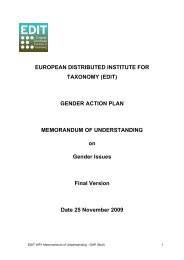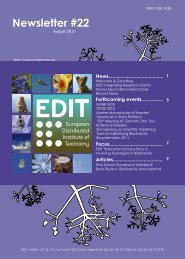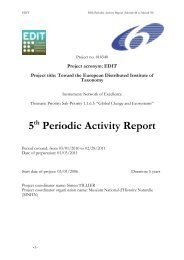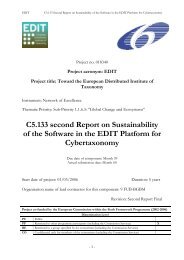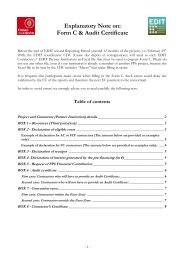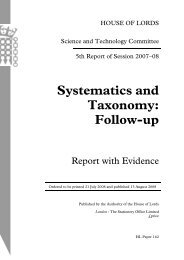Newsletter #5 - EDIT | - European Distributed Institute of Taxonomy
Newsletter #5 - EDIT | - European Distributed Institute of Taxonomy
Newsletter #5 - EDIT | - European Distributed Institute of Taxonomy
Create successful ePaper yourself
Turn your PDF publications into a flip-book with our unique Google optimized e-Paper software.
http://www.bionet-intl.org<br />
English, French and Spanish) that serve as<br />
communication platforms for taxonomists and<br />
non-taxonomists alike. BioNET’s communication<br />
work helps make taxonomists aware <strong>of</strong> the<br />
GTI and increases understanding <strong>of</strong> taxonomic<br />
issues among decision makers. BioNET also<br />
organises global workshops to further the<br />
strategic development <strong>of</strong> taxonomy and its<br />
application to conservation and development<br />
priorities. The 4th Global <strong>Taxonomy</strong> Workshop<br />
is planned 2009; interested organisations<br />
are invited to contact BioNET.<br />
on“TechnologiesforDemocratising<strong>Taxonomy</strong>»<br />
by end-users world-wide. Cooperation with<br />
technology partners such as the Consortium<br />
<strong>of</strong> the Barcoding <strong>of</strong> Life (CBOL) or the Centre<br />
<strong>of</strong> Biological Information Technology (CBIT)<br />
further enhances the delivery <strong>of</strong> high value,<br />
demand-driven and user-friendly taxonomic<br />
outputs.<br />
Training to meet local needs<br />
BioNET LOOPs have created many<br />
opportunities for taxonomy students<br />
and graduates to obtain training through<br />
scholarships and travel bursaries, and countless<br />
non-specialist training courses (for parataxonomists,<br />
farmers, environmentalists, etc.)<br />
have been conducted linking taxonomy with<br />
biodiversity conservation and/or agricultural<br />
productivity / agricultural trade. Among these<br />
Developing locally optimised taxonomic<br />
products and services<br />
To meet the development and conservation<br />
challenges <strong>of</strong> the 21st-century, taxonomists<br />
and taxonomic institutions such as natural<br />
history museums must have the capacity<br />
to develop, use and <strong>of</strong>fer tools and services<br />
for a range <strong>of</strong> specialist and non-specialist<br />
users. Diverse demands for taxonomic<br />
support include local-language and end-user-<br />
species such as potential invasives and pests,<br />
reference collections, as well as accurate and<br />
focusedtaxonomicidentificationaids,lists<strong>of</strong><br />
monitoring-services. With its highly developed<br />
partnership structure and track record working<br />
with developing countries, BioNET is uniquely<br />
positioned to accelerate the development <strong>of</strong><br />
taxonomic products and services by mobilising<br />
collective responses and customising products<br />
according to the formats and languages required<br />
costeffectiveidentification,surveyingand<br />
threatening biodiversity, workshops<br />
plant pests and diseases damaging local<br />
agriculture, demonstrations <strong>of</strong> pest damage<br />
and eco-friendly control, and courses plant<br />
pollinators.<br />
A special focus is given to taxonomic support <strong>of</strong> developing country exports - a<br />
key factor poverty reduction. Exporting<br />
countries need taxonomic knowledge <strong>of</strong> their<br />
regional pest and pathogen distributions and<br />
conservation,intheidentification<strong>of</strong>invasive aretraininginspeciesidentificationand<br />
occurrences in order to assess the risk their<br />
export commodities pose to importing countries<br />
and certify their exports appropriately. Equally,<br />
needed for monitoring imports so as to uphold<br />
sanitary and phytosanitary (SPS) standards<br />
and avoid trade disputes. Particularly BioNET-<br />
ASEANET has been active in conducting<br />
regional workshops the compliance with<br />
the SPS regulations<br />
<strong>of</strong> the World Trade<br />
Organisation.<br />
Through training,<br />
BioNET also supports<br />
its technology partners<br />
in introducing and<br />
e s t a b l i s h i n g<br />
modified or new<br />
technologies in the<br />
taxonomicidentificationtoolsandtrainingare<br />
12



